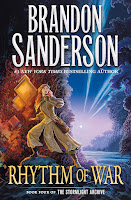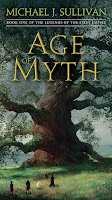It is that time of year again when I look back at the best
books I have read in the past year. This
has been a rather pathetic year for my blog.
I have not posted anything since last year’s book lists. There are a lot of reasons for that –
pastoral struggles and parenting an emotionally draining 4-year-old top the
list, in addition to pulling off the weddings of our two oldest children and
various COVID-19 complications.
Life may have been pathetic with regard to my blog this
year, but I did carve out some time to read some very good books. As always, I have divided my year in review
book posts into 3 topics – history/biography, ministry and ministry related,
and fiction.
Thanks to everyone who has shared with my how much they
appreciate these lists. I have had
people remark that they have used them to guide their own reading, as well as
their gift buying for the readers in their family.
Here are brief descriptions of the best history/biography
books I read in the past year as well a list of the rest of what I read.
The Brothers York:
A Royal Tragedy by Thomas Penn.
I have always been fascinated by medieval history, and although I have
read a book or two about the Wars of the Roses in England, the history of those
events have never been brought to life like they did in this book. Penn tells the tragic story of the York
Brothers with tremendous detail and great writing.
Coolidge by Amity Schlaes. I did not know much about Calvin Coolidge
before I read this book. After reading
this wonderful biography, I wish we had more Calvin Coolidges in public office
in America. What made Coolidge so
special? Schlaes does a wonderful job
explaining what made him tick – a faithful, lifelong commitment to smaller
government, public thrift and personal integrity. He is probably the one president who cut the
government budget year after year while in office.
 The Fall of the Ottomans:
The Great War in the Middle East by Eugene Rogan. When we think about World War 1, often the
only thing we know is the trenches in the Western Front of France. (See below)
But World War 1 was truly a global war.
Rogan tells the story of the war in Ottoman Empire, places we know today
as Turkey, Iraq, Egypt and Israel, and provides a fascinating and at times
disturbing survey of those events.
The Fall of the Ottomans:
The Great War in the Middle East by Eugene Rogan. When we think about World War 1, often the
only thing we know is the trenches in the Western Front of France. (See below)
But World War 1 was truly a global war.
Rogan tells the story of the war in Ottoman Empire, places we know today
as Turkey, Iraq, Egypt and Israel, and provides a fascinating and at times
disturbing survey of those events.
 The Western Front by Nick Lloyd. As noted above, the Western Front is usually
all we think about when we think of World War 1. And what we assume is that it is a boring
story of static, trench warfare. Nick
Lloyd, while not hiding the grisly price paid in lives on the Front, lets us
take a peek behind the scenes at the decision-making behind the battles. As each side dug in, both sides were
surprisingly creative in trying to find ways to break the deadlock and achieve
victory.
The Western Front by Nick Lloyd. As noted above, the Western Front is usually
all we think about when we think of World War 1. And what we assume is that it is a boring
story of static, trench warfare. Nick
Lloyd, while not hiding the grisly price paid in lives on the Front, lets us
take a peek behind the scenes at the decision-making behind the battles. As each side dug in, both sides were
surprisingly creative in trying to find ways to break the deadlock and achieve
victory.
Race and Culture:
A World View by Thomas Sowell.
I am ashamed I have not read much of Thomas Sowell’s writings baring an
occasional newspaper column.
Sowell is a
brilliant thinker and a trained economist with the ability to see things most
people do not.
In this book, Sowell
ruminates on both races and cultures and pokes holes in many of the modern
assumptions we hold about those topics.
Fateful Lightning:
A New History of the Civil War and Reconstruction by Allen
Guelzo.
I have read a number of American
Civil War surveys.
This is one of the
best.
If you are looking for a Civil War
book about campaigns and battles, look elsewhere.
If you want someone to guide you through the
origins, politics and motivations of the War or to show you how people lived
their personal and religious lives during the war, this is your book.
And the epilogue was actually the best
part.
In it Guelzo unpacks the roots of
the Confederate Lost Cause that still affects our country today.
Robert E. Lee: A
Life by Allen Guelzo.
Allen Guelzo
begins this biography with a question – how do you write a book about a
traitor?
While Lee had many sterling
qualities, at heart Guelzo sees him as a traitor to his own country.
The biography is exhaustive and well-written,
covering his whole life, not just his Civil War battles.
He ends the book discussing our modern-day
culture’s rejection of Lee, not because he was a traitor but because he was a (very
reluctant) slave owner, having received slaves in his father-in-law’s
estate.
The Last King of America:
The Misunderstood Reign of George III by Andrew Roberts.
Roberts is one of the best biographers out
there right now, and this book is revisionist biography at its best.
Recently hundreds of thousands of pages of George
III’s papers have been released for study, creating a treasure trove of new
material.
Roberts argues that George was
not the tyrant Thomas Jefferson made him out to be, but a moral, kind-hearted
ruler who woefully misunderstood the attitude of the American colonists and who
at pivotal times, struggled with a form of manic depression.
2nd Tier reads, still excellent and recommended:
Philip and
Alexander: Kings and Conquerors by
Adrian Goldsworthy
The
Habsburgs: To Rule the World by
Martyn Rady
Great
Society: A New History by Amity Schlaes
Island of the
Lost: An Extraordinary Story of Survival
at the Edge of the World by Joan Druett
The War of the
Copper Kings by C. B. Glasscock
Blood and
Treasure: Daniel Boone and the Fight for
American’s First Frontier by Bob Drury and Tom Clavin
Germantown: A Military History of the Battle for
Philadelphia, October 4, 1777 by Michael C. Harris
Double
Crossed: The Missionaries who Spied for
the United States during the Second World War by Matthew Avery Sutton
Madhouse at
the End of the Earth: The Belgica’s
Journey into the Dark Antarctic Night by Julian Sancton
The Road to
Jonestown: Jim Jones and the Peoples
Temple by Jeff Guinn
The Arsenal of
Democracy: FDR, Detroit and an Epic
Quest to Arm an America at War by A. J. Baime
Seven Days in
Hell: Canada’s Battle for Normandy and
the Rise of the Black Watch Snipers by David O’Keefe
A Holy Baptism
of Fire and Blood: The Bible and the
American Civil War by James P. Byrd
War on the
Border: Villa, Pershing, the Texas Rangers,
and an American Invasion by Jeff Guinn
Until Justice
Be Done: America’s First Civil Rights
Movement, From the Revolution to Reconstruction by Kate Masur
The Crooked
Path to Abolition: Abraham Lincoln and
the Antislavery Constitution by James Oakes
The
Indispensables: The Diverse
Soldier-Mariners who Shapes the Country, Founded the Navy and Rowed Washington
across the Delaware by Patrick O’Donnell
The
Confederacy’s Last Hurrah: Spring Hill,
Franklin and Nashville by Wiley Sword
Land of
Tears: The Exploration and Exploitation
of Equatorial Africa by Robert Harms
Sicily
’43: The First Assault on Fortress
Europe by James Holland
The Black
Prince: England’s Greatest Medieval
Warrior by Michael Jones
To Rescue the
Republic: Ulysses S. Grant, the Fragile
Union and the Crisis of 1876 by Bret Baier
3rd Tier reads, disappointing in some ways:
The Company: The
Rise and Fall of the Hudson’s Bay Empire by Stephen R. Bown
Winter King: Henry
VII and the Dawn of Tudor England by Thomas Penn
Summer of Blood:
England’s First Revolution by Dan Jones
Uggh! I am amazed I
finished it….
Alaric the Goth:
An Outsider’s History of the Fall of Rome by Douglas Boin



















